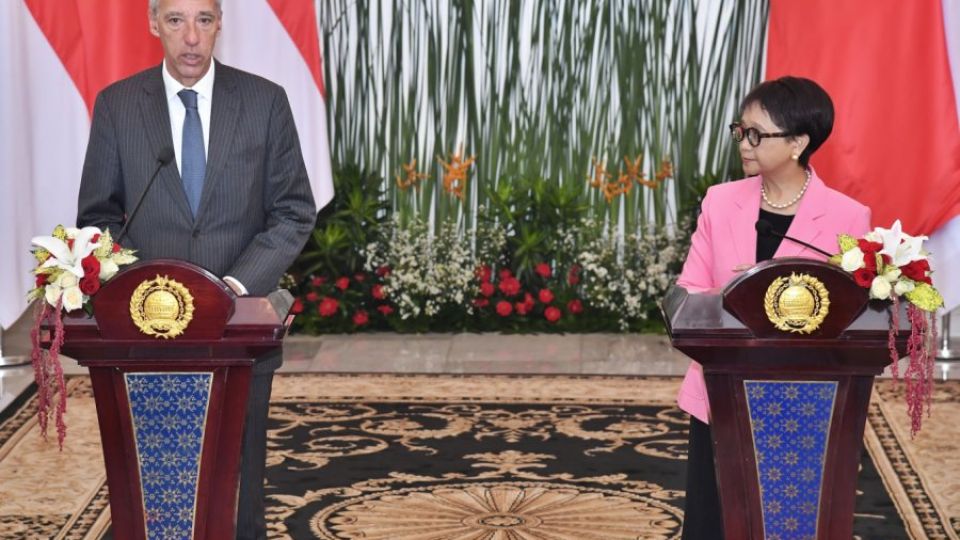July 26, 2023
JAKARTA – Marking the first high-level diplomatic visit to Indonesia in over a decade, Portuguese Foreign Minister João Gomes Cravinho on Monday met with his counterpart Retno LP Marsudi in Central Jakarta, where the two diplomats reaffirmed their commitment to boosting the Jakarta-Lisbon trade relationship and plans to explore non-traditional economic cooperation.
Despite enormous opportunities for cooperation in certain areas, the Indonesia-Portugal relationship has so far not been effectively pursued, said Cravinho, adding that intensifying cooperation would prove beneficial for the two countries.
Investment, palm oil cooperation, energy cooperation and maritime cooperation were discussed, Retno explained.
“First, on investment. There has been a remarkable growth in our investment value. [Portuguese] investment in Indonesia significantly grew by 2,000 percent from 2019 to 2022. Indeed, this is a record-high number,” Retno said, underlining that renewable energy and the blue economy have been set as current investment priority sectors.
In 2021, investment realization from Portugal amounted to US$1.65 million across 13 projects, according to data from the Foreign Ministry.
A $2 billion investment pledge from Energias de Portugal (EDP) Renewables for a floating solar project in Batam, Riau Islands, was also announced during the visit.
“[The project] could serve as a catalyst for more Portuguese investment and in our renewable energy,” Retno suggested.
Later speaking to The Jakarta Post, Cravinho said that Portugal had much to offer Indonesia in the renewable energy sector, explaining that these newer models of cooperation must be intensified to complement existing traditional partnerships.
“In terms of renewables, Portugal was an early starter. Last year, 60 percent of our electricity was from renewables. This year is going to [see the number] closer to 70 percent. […] What that means is that we have a lot of Portuguese companies that are very competitive because we’ve been doing this for a very long time,” said Cravinho.
Lisbon’s multibillion-dollar investment in Batam, Cravinho explained, was an example of Portugal’s ambition to explore non-traditional avenues of cooperation, adding that it is also currently working with Japanese company Sumitomo to build a link between Batam and Singapore.
“The idea is that [this is] not just a link. It’s a creation of an ecosystem for renewables in Indonesia. It’s really about the economy of the future, and that stuff is very interesting,” Cravinho added.
Both Portugal and Indonesia play a leadership role in the renewable blue economy sector, said Cravinho, adding that a more intense cooperation could see an enhanced production of ocean-extracted products, ranging from cosmetics to medicines.
“I think there are enormous economic potentials [between Indonesia and Portugal] that are completely underutilized.”
Underlying problems
With Portugal being a member of the European Union, the ongoing controversy between Europe’s deforestation stance and Indonesia’s protection of its palm oil industry hung over the meeting between Retno and Cravinho, with the former using the occasion to reiterate Jakarta’s position.
“I appreciate Portugal’s faith in palm oil from Indonesia. Portugal’s import of Indonesian palm oil increased by 77 percent from 2019 to 2022. […] I reiterated during the conversation about the number of discriminatory policies taken by the EU, including the European Union Deforestation Regulation [EUDR],” Retno asserted.
The EUDR, which seeks to ban any products linked to deforestation taking place after Dec. 31, 2020 from entering the vast European market, has in recent months caused heated pushback from Indonesia, whose key exports including coffee, soy and palm are likely to be targeted by the new rule.
While a joint task force between the EU and the world’s two largest crude palm oil (CPO) producers, Indonesia and Malaysia, had been created to overcome the differences, Jakarta has so far remained insistent that the policy is discriminatory.
Indonesia continues to argue that developing countries with limited capacity to swiftly transition their industries into becoming environmentally friendly face the brunt of the new rule, despite the EU offering its technical assistance to ease the process.
After his meeting with Retno, Cravinho told the Post that though the EU deforestation stance was part of an important global movement, an effective mechanism must take place to ensure that countries like Indonesia were not penalized for having a larger forested area.
Concluding Cravinho’s brief visit, Retno said that the meeting had created momentum for a renewed bilateral relationship.
“It is truly an honor for me to receive the first visit of the Portuguese Foreign Minister to Indonesia in more than a decade.”


